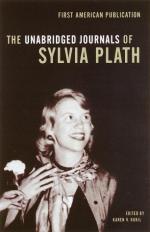|
This section contains 6,899 words (approx. 23 pages at 300 words per page) |

|
SOURCE: Lindberg-Seyersted, Brita. “‘Bad’ Language Can Be Good: Slang and Other Expressions of Extreme Informality in Sylvia Plath's Poetry.” English Studies 78, no. 1 (January, 1997): 19-31.
In the following essay, Lindberg-Seyersted traces instances of slang in Plath's poetry.
I
In a great number of Sylvia Plath's poems, the reader is invited to listen to a voice talking. Usually those poems feature an I-person, identifiable or not as to gender and situation in life. But even when there is no first-person speaker, a poem can be perceived as ‘speech’ rather than ‘text’. Such speech-like quality applies pre-eminently to Plath's later work, above all to poems written in 1962, her peak period as a literary artist. The poetry she wrote as a newly established professional poet, from 1956 and on for a couple of years, is mostly characterized by a highly ‘literary’ style with a complex syntax; a dignified, often archaizing diction parading words...
|
This section contains 6,899 words (approx. 23 pages at 300 words per page) |

|


